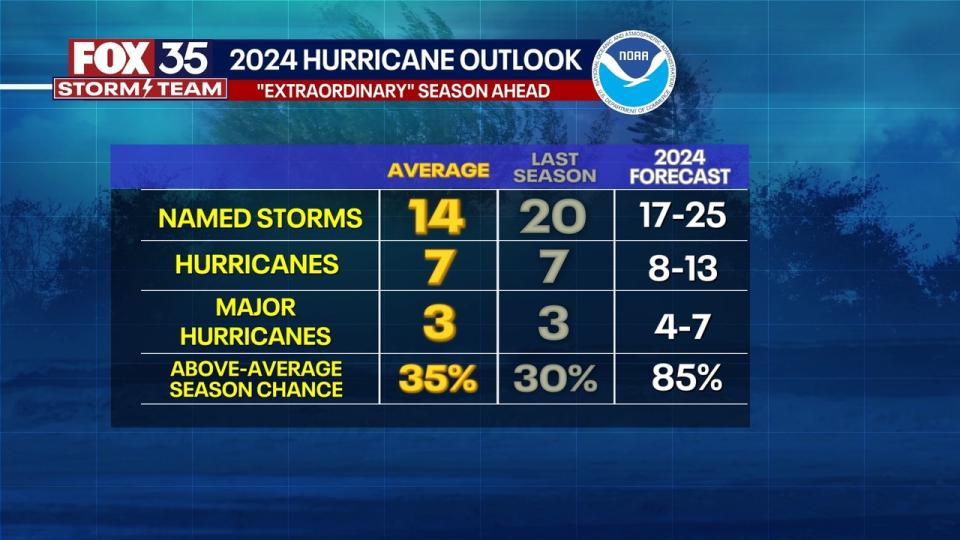ORLANDO, Fla. - Saturday, June 1 marks the official start of the 2024 Atlantic hurricane season andforecasters predict an "above-normal" season this year.
Experts with the National Oceanic and Atmospheric Administration (NOAA) said they are 70% confident that there will be a whopping 17 to 25 total named storms this season. Eight to 13 of those are forecast to become hurricanes, with 4 to 7 of those potentially reaching major hurricane strength. It's the greatest number of hurricanes predicted by NOAA in its annual May forecast since 2010 when it predicted 14 to 23 named storms.
Colorado State University (CSU) also shared its seasonal prediction, which is significant because it's the most extreme season they've ever forecast since releasing their predictions publicly in the 1990s, FOX 35 Storm Team Meteorologist Brooks Garner said.
CSU researchers predict 23 named storms for 2024. Of those, they believe 11 will become hurricanes, including 5 that will become major hurricanes. According to their findings, the probability of a major hurricane making landfall on the United States coastline is 62%.
It's important to remember that this does not mean storms will reach the US or make landfall in Florida – as they can, and often do – curve away. But more storms do increase the chance of them possibly making landfall.
It is vital, however, to be prepared should a tropical storm or hurricane impact the area, and that's why FOX 35 has compiled this guide to help.
What is a tropical storm?
A developing system receives a name once it strengthens into a tropical storm, which means the cyclone has maximum sustained winds of 38 mph or less, according to the National Hurricane Center.
These storms often cause widespread, severe rainfall that could lead to deadly and destructive flooding.
Hurricane and major hurricane: What's the difference?
A hurricane refers to a system with life-threatening winds of 74 mph or higher.
Hurricanes are given a 1 to 5 category (often abbreviated as Cat.) rating based on the Saffir-Simpson Hurricane Wind Scale, which the NHC said estimates potential property damage. The category increases as a storm strengthens up the scale.
Saffir-Simpson Hurricane Wind Scale
Cat. 1: Sustained winds of 74-95 mph
Cat. 2: Sustained winds of 96-110 mph
Cat. 3: Sustained winds of 111-129 mph
Cat. 4: Sustained winds of 130-156 mph
Cat. 5: Sustained winds of 157 mph or higher
If a hurricane receives a rating of Category 3, 4 or 5, it is considered a major hurricane.
"Major hurricanes can cause devastating to catastrophic wind damage and significant loss of life simply due to the strength of their winds," the NHC website states. "Hurricanes of all categories can produce deadly storm surge, rain-induced floods, and tornadoes. These hazards require people to take protective action, including evacuating from areas vulnerable to storm surge."
What should you do if a tropical storm or hurricane threatens?
If a hurricane or tropical storm were to impact Florida or other communities, officials say to secure your home ahead of time, check your local government and emergency management's websites for updates and tune in to the radio or TV stations for the latest storm developments.
If your local officials instruct you to evacuate, you should leave immediately.
Those who are not ordered to evacuate should take the following advice from the National Weather Service:
Take refuge in a small interior room, closet, or hallway on the lowest level during the storm. Put as many walls between you and the outside as you can.
Stay away from windows, skylights, and glass doors.
If the eye of the storm passes over your area, there will be a short period of calm, but at the other side of the eye, the wind speed rapidly increases to hurricane force winds coming from the opposite direction.
How to prepare for hurricane season in Florida
Being prepared can include a multitude of things, like stocking up on supplies, knowing when you should evacuate, determining if there is a flood risk where you live and having a conversation with your insurance company to have adequate wind and flood protection.
The Florida Department of Emergency Management (FDEM) provides an annual disaster supply checklist to use as a guide. See below:
Click to open this PDF in a new window.
There are also several resources for emergency hurricane tips:
How to find your evacuation zone
Visit Florida's Know Your Zone website, and search for your address to see which designated evacuation zone you're in, if there is one.
"The best way to be prepared for a hurricane storm surge is to know your evacuation zone and plan your destination and travel routes ahead of time," the website reads.
Evacuation zones are designated by a letter – from "tropical storm zone" to "Zone L." Those within a tropical storm zone and zone A are considered to be the most vulnerable, according to the website.
No other counties have an F zone, except some in Northeast Florida.
If you live in an evacuation zone and are told to evacuate, you should go. Zone A is considered to be most vulnerable, while Zone F is likely to be evacuated last, according to the website.
Florida designated evacuation zones
Tropical Storm Zone
Zone A
Zone AB (Monroe)
Zone B
Zone BC (Volusia)
Zone C
Zone D
Zone DE (Volusia)
Zone E
Zone F (Collier, Duval, Flagler, Nassau, St. Johns)
Zone L (Palm Beach)
Black Creek Main Branch (Clay)
Black Creek North Fork (Clay)
Black Creek South Fork (Clay)
To find your evacuation route, you can also visit the Know Your Zone website. Each county has its own map with each zone's evacuation route.
Stay connected with FOX 35
Download the FOX 35 News app for latest news, weather, and traffic alerts
Download the FOX 35 Storm Team Weather app for live, interactive radar
Visit FOX35Orlando.com/weather for interactive radar, plus updated weather graphics, maps, and images

